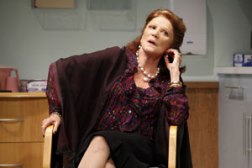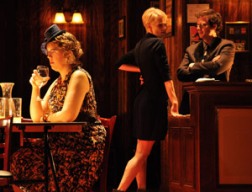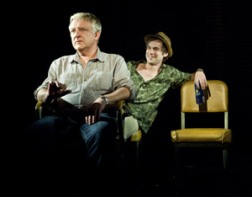Category: "Off-Broadway"
Review: The Lyons
Oct 12th

Contemporary playwrights seem forever bent on proving Tolstoy’s line that “all families are unhappy in their own way.” The latest example is Nicky Silvers, who has mined such territory to fruitful comic effect in plays like Raised in Captivity, The Food Chain and others. Unfortunately, The Lyons, his latest effort, feels all too redolent of the sort of untapped anger and shame that would have been better explored in therapy.
The characters in this dark comedy directed by Mark Brokaw are all troubled or repellant. Ben (Dick Latessa), the patriarch of the Lyons family, is dying of cancer, but that doesn’t stop him from spewing obscene tirades at everyone around him. His long-suffering wife Rita (Linda Lavin) mainly sits by his bed flipping the pages of a magazine in-between providing acidly sarcastic comments. Daughter Lisa (Kate Jennings) is a divorced alcoholic, and gay son Curtis (Michael Esper) clearly has psychological issues.
The play’s first act, set in Ben’s hospital room, is cohesive enough, with the family members basically insulting each other with impunity. The playwright hasn’t lost his ability to craft sharp one-liners, which are delivered by old pros Latessa and Lavin with comic perfection. But the humor is forced, with a heavy reliance on would-be shocking profanity to garner cheap laughs.
The play goes completely off the rails in the second act, especially in a lengthy scene depicting an encounter between Curtis and a hunky real estate broker (Gregory Wooddell) that takes a shocking and violent turn. Curtis then winds up in the hospital, being attended to by the same nurse (Brenda Pressley, making the most of her small role) that handled his late father.
To many theater insiders’ surprise, Lavin took this role rather than transfer to Broadway in the acclaimed productions of Other Desert Cities or Follies. It’s easy to see why the actress was attracted to her role here—it’s a deliciously colorful one, and she basically runs away with the evening. But compared to those works, The Lyons is a trivial, shallow enterprise that only exploits her considerable talents.
Vineyard Theatre, 108 E. 15th St. 212-353-0303. www.vineyardtheatre.org.
Review: The Bald Soprano
Sep 28th

With some exceptions, absurdism doesn’t age particularly well. The impact of what was shocking and avant-garde decades ago is reduced by the endless mediocre imitations that have followed throughout the years. Such is the case with The Bald Soprano, Eugene Ionesco’s one-act “anti-play” (the playwright’s description) about language and middle-class life that is now being revived by the Pearl Theatre. While the production displays a loving attention to the work’s detailed and purposeful deconstruction of its targets, the work comes across today as an extended sketch whose satirical points are repeated ad infinitum.
Set during “an English evening” in “an English interior,” it depicts the interactions among two suburban couples--named in pointedly bland fashion the Smiths and the Martins—as well as the Smith’s maid, Mary (Robin Leslie Brown), and a fire chief (Dan Daily) who unexpectedly drops by “on official business.”
It begins with the Smiths sitting in their cozy parlor, with Mrs. Smith (Rachel Botchan) attempting to make small with her distracted husband (Bradford Cover) who at first responds only with clicking noises of his tongue. Eventually they’re joined by the friends the Martins (Brad Heberlee, Jolly Abraham), who don’t seem to quite recognize each other despite the fact that they’re married.
The playwright claimed that he was inspired to create the piece while attempting to learn English, and the dialogue mirrors the sort of banal phrases that one encounters in language manuals. As the play proceeds, the language further dissolves into a series of non-sequiturs that are even more ridiculous than the preceding exchanges.
For the play to work today, it would have to be presented with the sort of atmosphere and imagination that went into the Broadway revivals of such (admittedly far superior) Ionesco plays as The Chairs and Exit the King. Although ably acted by the ensemble and featuring a nifty set by Harry Feiner that includes a rear wall that appears to be upside down, director Hal Brooks’ production never quite captures the work’s anarchic spirit. Although it’s good to see The Bald Soprano receive a professional production—in more than thirty years of theatergoing, I’ve never before come across it except on the page—it will best be appreciated by academics and completists.
New York City Center Stage II, 131 W. 55th St. 212-581-1212. www.nycitycenter.org.
The Swedish Invasion: An Interview with Jonas Hassen Khemiri
Sep 27th

Last season, the Play Company’s production of Invasion! at Soho Rep left made quite an impact, garnering an OBIE award for playwright Jonas Hassen Khemiri, in his debut as a playwright. This season, Invasion! returns to New York, this time enjoying a run at Tribeca’s Flea Theater.
Invasion! is a dark comedy, nimbly colliding characters and stories while subtly ratcheting up a sense of tension and paranoia. One word, “abulkasem,” takes on diverse interpretations, leading to various situations that escalate rapidly (Invasion! is directed by Erica Schmidt and was translated by Rachel Willson-Broyles). I spoke with Khemiri, a Stockholm, Sweden, native, as the play began its run at the Flea.
ScheckOnTheArts: Where did the idea for the show come from?
Jonas Hassen Khemiri: I wanted to write a play about a magical name. I was curious about all the things you could do with a name, a word. The way people look at a name, the way people dream about a name tells us a lot about them. It says nothing and it says it all.
SOA: Invasion! is a complex play. Did anyone ask you to try and summarize it? Is it even possible for you to do so?
JHK: The play is about the notion of outside fear. The idea of there being a menace outside, and how it’s used to create an idea of a collective “us.”
SOA: And how does “abulkasem” help create that?
JHK: The Play Company questions boundaries. “Abulkasem” shows the manipulative power of words. Words are riddles, and that can be difficult for a contemporary audience. We have a rather two-dimensional image of “the other.” This play tricks the audience. People we trust turn out to be untrustworthy. Fantasies, though, are trustworthy. They tell us about people in a truthful way.
SOA: It sounds like you like challenging your audience.
JHK: I respect the audience. I want them to be careful watchers. They’re smart enough to be bombarded with multiple messages. They can’t just lean back [in Invasion!]. My actors go in and out of their roles quickly (the four-person cast, comprised of Francis Benhamou, Nick Choksi, Andrew Ramcharan Guilarte and Bobby Moreno, play numerous characters), and I love the speed of that, I love that feeling of “I missed something.” Which is not necessarily bad.
SOA: How does the process of translating your writing work?
JHK: It works very well. I met Rachel when I was visiting University of Wisconsin at Madison. It was a stroke of genius. Other translators hadn’t captured my voice and rhythms. She hadn’t translated before, but she understood the way my language moves. At this point, I view it as the text being amputated from me and put other places.
More information about Invasion! can be found at http://www.theflea.org
----- Doug Strassler
Review: The Select (The Sun Also Rises)
Sep 15th
 Try as I might, I find it impossible to appreciate the Elevator Repair Service’s aesthetic. This enterprising downtown troupe has made a significant name for themselves in recent years with their theatrical adaptations of classic Americans novels, of which The Select (The Sun Also Rises) is the last in a trilogy. But like the highly acclaimed Gatz and The Sound and the Fury (April Seventh, 1928), their versions of Fitzgerald’s The Great Gatsby and Faulkner’s The Sound and the Fury, this staging of Ernest Hemingway’s classic 1926 novel is less interested in elucidating the text than in pointless gimmickry.
Try as I might, I find it impossible to appreciate the Elevator Repair Service’s aesthetic. This enterprising downtown troupe has made a significant name for themselves in recent years with their theatrical adaptations of classic Americans novels, of which The Select (The Sun Also Rises) is the last in a trilogy. But like the highly acclaimed Gatz and The Sound and the Fury (April Seventh, 1928), their versions of Fitzgerald’s The Great Gatsby and Faulkner’s The Sound and the Fury, this staging of Ernest Hemingway’s classic 1926 novel is less interested in elucidating the text than in pointless gimmickry.
Thankfully, this evening isn’t a word-for-word recitation of the novel, as with the case with the butt-numbing, daylong Gatz. But it does contain vast chunks of the book’s exposition and dialogue, and the three-and-a-half hour long running time feels endless.
Hemingway’s novel, you’ll recall, concerns a group of expatriates whiling away their days and nights in a Paris bar. They include American journalist Jake Barnes, the narrator and the author’s stand-in (Mike Iveson); Brett Ashley (Lucy Taylor), a sexually ravenous Brit; and Robert Cohn (Matt Tierney), a Jewish novelist and former Princeton boxing champ. Add to that such eccentric as a dashing bullfighter (Susie Sokol, in a cross-dressing turn) and a flamboyant Spanish hotelier (Vin Knight), and you have a colorful array of characters.
Director John Collins’ staging fails to either convey the strength of the novel or add anything imaginative in place of it. Primarily, the piece seems designed to show off the sound effects wizardry of Matt Tierney and Ben Williams, who have provided an array of noises to complement the largely mimed action--liquid being poured into glasses, the thumps of a fistfight, the cheers of a roaring crowd, etc. With the production of these effects often fully displayed, the result is that you feel you’re attending the taping of a lavishly staged radio show.
The acting ranges from bland (Barnes, Taylor) to over-the-top (nearly all of the supporting players), and neither the performances nor the anachronistic costumes sufficiently convey the period.
Clearly, Elevator Repair Service is a company that one either loves--as the New York Times certainly does--or hates, as evidenced by the numerous walkouts during intermission. But while one can certainly admire their ambition, not to mention the sheer stamina required for these efforts, it’s less easy to take pleasure in the strained, marathon results.
New York Theatre Workshop, 79 E. 4th St. 212-279-4200. www.ticketcentral.com.
Review: Bluebird
Aug 23rd
 It seems almost criminal to take one of the English speaking theater’s finest classical actors, have him appear in a play in a tiny basement theater, and then make the run so limited that it sells out virtually immediately. But such is the case with the Atlantic Theater Company’s production of Bluebird, starring Simon Russell Beale.
It seems almost criminal to take one of the English speaking theater’s finest classical actors, have him appear in a play in a tiny basement theater, and then make the run so limited that it sells out virtually immediately. But such is the case with the Atlantic Theater Company’s production of Bluebird, starring Simon Russell Beale.
It’s rare--certainly on these shores--for Beale to play contemporary roles, but he does so in this 1998 drama by Simon Stephens that was originally produced at London’s Royal Court Theatre. The actor stars as Jimmy, a London taxi driver whose placid demeanor and casual chattiness belies a raging turmoil underneath.
For much of the play’s 100-minute running time, the action consists of Jimmy’s interactions, ala Travis Bickle in Taxi Driver, with a variety of eccentric passengers, or, as he refers to them, “fares.” They include, among others: the grieving father (Michael Countryman) of a murdered young girl; a hard-edged but flirtatious prostitute (Charlotte Parry); a burnt-out engineer (Todd Weeks) for the London Underground and a menacing bouncer (John Sharian).
Periodically, Jimmy leaves his taxi to make plaintive phone calls to a woman we eventually learn is his ex-wife (Mary McCann). At first, she refuses to talk to him, but eventually she relents and agrees to a late night drive.
It’s this final confrontation, in which we learn the true nature of Jimmy’s demons, which forms the dramatic heart of the play. But while this climactic scene is indeed powerful, the play takes too long in getting there. Besides the unlikelihood of Jimmy’s being able to draw enough self-revealing monologues from his passengers to fill a season’s worth of HBO’s Taxicab Confessions, the encounters themselves are either overly contrived or simply dull. For too long, Beale has little to do other than provide vaguely bemused reactions.
Still, the final scene, beautifully acted by Beale and McCann, does pack a dramatic punch. And the intimacy of the theater indeed serves this miniaturist drama well. Bluebird is not a great play, but it stars a great actor, so do whatever you have to do to procure tickets.
Atlantic Stage 2, 330 W.16 th St. 212-279-4200. www.ticketcentral.com.